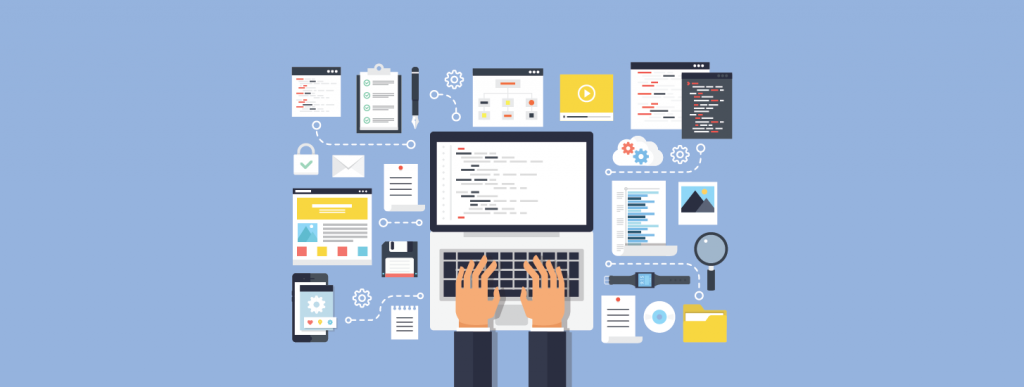Different Phases of Mobile App Development for Businesses
Mobile applications have become mandatory for every business in the current times irrespective of the nature and size of the business. These apps allow businesses to create a direct marketing channel and to provide them with an opportunity to enhance the customer base. There are various business organizations in every sector and the utility of their respective mobile apps provide a competitive edge over the rest of the industry. Customer engagement along with the brand value also improves with the presence of a usable mobile app. Because of these reasons, it is of utmost importance that the mobile app is designed in such a manner to fulfill certain parameters to emerge out as a winner in the market.
The Lifecycle of a Successful Mobile App
A successful mobile application is an amalgamation of latest technology, tactful planning, and management along with the excellent user experience. There are different phases in the creation of a successful mobile application
Planning & Analysis: It is necessary to ensure that extensive planning and analysis are involved in the design, development, and deployment of the mobile app for a business. Business requirements along with the target audience shall be identified at this stage to make sure that the outcome is as per the client’s specifications. Problem statement shall be carefully analyzed and a solution according to the same shall also be planned. Features of the app shall be classified in three broad categories as functional requirements, non-functional requirements, and user-interface requirements.
Feasibility study of the application in terms of technical, operational and economic feasibility shall be carried out as the first step.
Identification of Mobile Platforms & Revenue Model: There are various mobile platforms and devices that are available and are being used by customers. The mobile app that has to be developed for a business shall identify the target mobile devices and platforms in terms of device support, performance and other quality parameters.
The primary purpose of the development of a mobile app for any business is to enhance the customer base and earn maximum revenue out of the application. The revenue model shall be pre-identified such as paid application, in-app advertisements, pay per download and likewise.
Type of Application: There are primarily three categories of mobile applications as native apps, web apps, and hybrid apps. Native apps are platform-dependent apps that require significant effort, cost and time to be developed. These apps score high in terms of user experience but also come with higher costs. Web apps are the applications that are cheaper and can run on multiple platforms. However, these are less powerful in comparison with the native apps. Hybrid apps are the amalgamation of native and web apps that combine the web code with the native language. The type of the app shall be decided as per the business specifications and the target users.
Mobile User-Interface (UI) Design Parameters: The design of the mobile app plays a key role in its success or failure. It is necessary to have a responsive and visually appealing design to provide the best user experience. Consistency is one of the primary design principles that shall be reflected in the mobile application. The layout, styling, and navigation shall not vary from one screen to another. Users shall feel connected with the application and therefore, it is necessary to have a match between the mobile app and the real-world scenarios. Also, the users shall be provided with considerable control and freedom in terms of the application usage. Visibility is also one of the prime principles that must be included in terms of system feedback to the users. Use of error messages will boost the application design and will also lead to the avoidance of the problems. Application designers must avoid the use of excessive scrolling or overload of content on any of the application screens. Users shall be able to easily recognize the application flow and they shall also be provided with the flexibility and ease of usage. Help and support documentation must be included in the application to gain customer trust.
Offline Access: Users do not wish to spend a lot of data on any application and like to access certain features of the application in the absence of network connectivity. The application that is developed for a business must grant users access to app features in offline mode too. It will enhance the application availability leading to higher customer satisfaction.
Marketing Strategy: Development of an accurate marketing strategy for any mobile app is very important for the success of the application. It is required for the business to make the customer familiar with the features of the app so as to enhance the number of app users. There are various marketing mediums that are available such as tele-media, social media, and print media and so on. Identification of the marketing channels along with marketing strategy shall be developed for the required marketing of the app.
Mobile Application Testing: Testing of the mobile application shall be carried out before its deployment. The application developers shall not restrict to system and integration testing in case of the mobile app. Other forms of testing such as load and performance testing, security testing and UI testing shall also be carried out to avoid any defects in the functional specifications along with the system qualities and UI parameters. Customers shall also be included in the testing processes to gain their valuable feedback. The final release shall not include any of the bugs identified in the testing procedures.
Data Analytics Tools: There are various automated tools that have been developed for data analysis. Such tools shall be integrated with the mobile app developed for business so as to analyze the customer data and identify the customer preferences, choices, patterns, and trends. These results will allow the business to improve their strategies and practices. Also, the app shall be developed as per the customer requirements and preferences.
Mobile applications have become an integral part of the modern-day businesses. It is, therefore, a prime concern for businesses to develop mobile apps to be omnichannel and to offer amazing user experience with all necessary features and functionalities. Responsive web design shall be used during the development of the mobile apps to achieve higher customer satisfaction. A phased approach shall be used by the mobile application development team which shall include planning & analysis, designing, development, testing and deployment as the primary phases.
Stay up to date on what's new

Recommended Posts

13 Jan 2021 Sports
Fingent Sponsors Kerala’s First Women’s Cricket Team’s Maiden UAE Tour!
Fingent Takes Up the Title Sponsorship of Kerala’s First Women’s Cricket Team’s Maiden UAE Tour Amid the uncertainties posed by the COVID-19 pandemic leading to the cancellation and adjournment of……

17 Dec 2018 Logistics Travel
Top Challenges Faced by Logistics Management Today
Top Challenges Logistics Managers Face Everyday In the present scenario of global economics, logistics play a key role in facilitating trade and, by extension, ensuring the success of business operations.……

24 Oct 2018
Points to Consider Before Choosing the Best Software Development Company
So, You- one of the key decision makers of your company, have a cool idea, a plan or a requirement for a software application, a mobile application for your business,……

14 Sep 2017
Fingent Corp. – Top Enterprise App Development Company
Fingent Corp. is one of the top enterprise app development companies across the globe. A reliable and affordable Web and Mobile Development company for enterprises and mid-sized organizations like SONY,……
Featured Blogs
Stay up to date on
what's new












